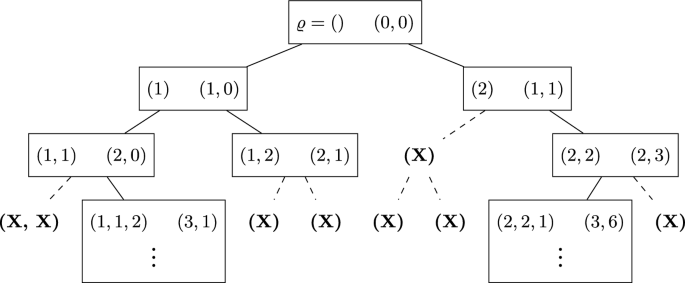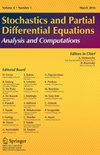具有Besov随机树先验的椭圆偏微分方程的多层蒙特卡罗有限元
IF 1.4
3区 数学
Q2 MATHEMATICS, APPLIED
Stochastics and Partial Differential Equations-Analysis and Computations
Pub Date : 2023-09-30
DOI:10.1007/s40072-023-00313-w
引用次数: 1
摘要
我们开发了一种多层蒙特卡罗(MLMC)-FEM算法,用于求解多元域$${\mathcal {D}}\subset {\mathbb {R}}^d$$ D∧R D上具有besov树随机系数的线性椭圆扩散问题。也就是说,扩散系数的对数是从所谓的贝索夫树先验中采样的,贝索夫树先验最近被提出用于科学和工程中分形现象的建模数据。椭圆型PDE的全离散有限元数值分析包括正交近似,并且必须考虑(a)非均匀路径上和下系数边界,以及(b) Besov-tree系数的低路径正则性。允许的非参数随机系数对应于分形维数可调的随机分形上具有奇异性的随机函数,但不涉及样本路径奇异支撑的分形几何的先验规范。证明了兴趣量及其二阶矩的最优复杂度和收敛速率估计。对MLMC-FEM算法进行了收敛性分析,给出了算法转向参数的选择,以保证算法的有效实施。给出了MLMC-FEM近似的复杂度(“误差与工作量”)分析。本文章由计算机程序翻译,如有差异,请以英文原文为准。

Multilevel Monte Carlo FEM for elliptic PDEs with Besov random tree priors
Abstract We develop a multilevel Monte Carlo (MLMC)-FEM algorithm for linear, elliptic diffusion problems in polytopal domain $${\mathcal {D}}\subset {\mathbb {R}}^d$$ D ⊂ R d , with Besov-tree random coefficients. This is to say that the logarithms of the diffusion coefficients are sampled from so-called Besov-tree priors, which have recently been proposed to model data for fractal phenomena in science and engineering. Numerical analysis of the fully discrete FEM for the elliptic PDE includes quadrature approximation and must account for (a) nonuniform pathwise upper and lower coefficient bounds, and for (b) low path-regularity of the Besov-tree coefficients. Admissible non-parametric random coefficients correspond to random functions exhibiting singularities on random fractals with tunable fractal dimension, but involve no a-priori specification of the fractal geometry of singular supports of sample paths. Optimal complexity and convergence rate estimates for quantities of interest and for their second moments are proved. A convergence analysis for MLMC-FEM is performed which yields choices of the algorithmic steering parameters for efficient implementation. A complexity (“error vs work”) analysis of the MLMC-FEM approximations is provided.
求助全文
通过发布文献求助,成功后即可免费获取论文全文。
去求助
来源期刊

Stochastics and Partial Differential Equations-Analysis and Computations
Mathematics-Modeling and Simulation
CiteScore
2.70
自引率
13.30%
发文量
54
期刊介绍:
Stochastics and Partial Differential Equations: Analysis and Computations publishes the highest quality articles presenting significantly new and important developments in the SPDE theory and applications. SPDE is an active interdisciplinary area at the crossroads of stochastic anaylsis, partial differential equations and scientific computing. Statistical physics, fluid dynamics, financial modeling, nonlinear filtering, super-processes, continuum physics and, recently, uncertainty quantification are important contributors to and major users of the theory and practice of SPDEs. The journal is promoting synergetic activities between the SPDE theory, applications, and related large scale computations. The journal also welcomes high quality articles in fields strongly connected to SPDE such as stochastic differential equations in infinite-dimensional state spaces or probabilistic approaches to solving deterministic PDEs.
 求助内容:
求助内容: 应助结果提醒方式:
应助结果提醒方式:


